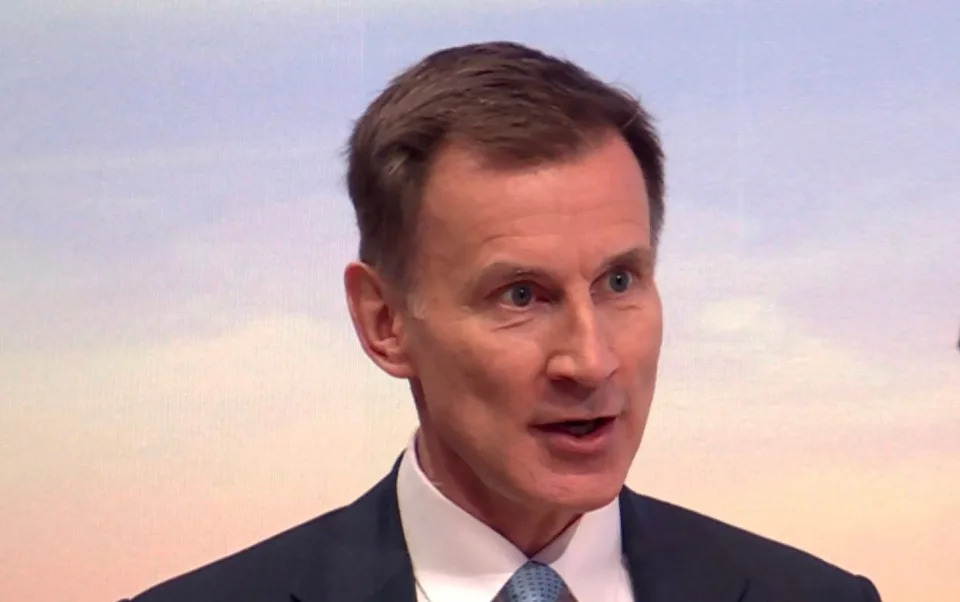One person has been taken to hospital following a chemical leak in Trafford Park, Manchester that has since been contained.
Connor Parker and James Hockaday
Updated Mon, 4 March 2024
Emergency services were dispatched to the site of chemicals firm Lanxess on Tenax Road in Trafford Park, Greater Manchester. (MEN Media)
One person has been taken to hospital after a "major incident" was declared at a business site in Greater Manchester following a chemical leak on Monday morning that has since been contained.
Emergency services, including fire and ambulance crews, were sent to the scene near the site of chemicals firm Lanxess on Tenax Road in Trafford Park, with several vehicles seen parked outside.
A dozen people were assessed by paramedics, and North West Ambulance Service initially said no one required further treatment. On Monday afternoon, Lanxess said one of its employees was "taken to hospital for observation as a precaution", with one unconfirmed report claiming they had "breathed in chemical vapour".
The leaked substance was confirmed to be phosphorus oxychloride, which can cause serious illness if inhaled and, in some cases, can be fatal.
Paramedics at the scene on Monday morning. (MEN Media)
What we know
At around 9am Monday, Greater Manchester Police were called to reports of a “hazmat incident” at a business site in Trafford Park, in the town of Stretford.
Officers cordoned off the site as fire crews and ambulances were also sent to the scene.
No injuries were initially reported, and everyone at the affected business in in Tenax Road had been accounted for, emergency services said on Monday morning. North West Ambulance Service said: “Very quickly, we have been able to account for all potential patients, assessing more than a dozen people. Nobody has required further treatment.”
Lanxess said in a follow-up statement on Monday afternoon: "One person was taken to hospital for observation as a precaution. The cooperation with emergency services and authorities went smoothly."
Residents living near the 300m cordon were advised to keep their windows and doors closed. Yahoo News spoke to one business across the street from the plant, which took an independent decision to evacuate.
Surrounding businesses have not been ordered by authorities to evacuate, it is understood, with some telling Yahoo News they had opted to carry on as normal. A member of staff from a nearby crane hire centre said it was "business as usual" for them, adding that the only updates they were receiving were from reading the news.
Manchester Police had said a "number of surrounding roads have been closed as a precaution". Nearby Metrolink tram services were partially disrupted due to the incident but subsequently returned to normal.
Several emergency vehicles were seen parked outside the Lanxess site after a 'major incident' was declared. (MEN media)
In a statement, Greater Manchester Fire and Rescue said: "Just before 9am this morning 12 fire engines from across Greater Manchester were called to reports of a suspected chemical incident at an industrial site on Tenax Road, Trafford Park.
"Firefighters wearing breathing apparatus are working alongside site staff and other emergency services to contain the incident and keep the area safe.
In a statement issued at 11:55am, Lanxess said the situation was under control.
A spokesperson for the German chemicals firm said: "During the unloading of a supplier's tanker truck, a chemicals leak occurred on the factory premises in Trafford Park, Manchester at around 9am on March 4.
"Meanwhile, the leakage has been stopped. The leaked substance is phosphorus oxychloride. Residents are advised to keep windows and doors closed."
Later in the afternoon, the company said: “The safety of our employees and local residents is our top priority. We have started to investigate the incident thoroughly and regret the inconvenience caused.”
Lanxess opened in Trafford Park 1939 to manufacture phosphate-based plasticisers. Through the years, the research facility at Trafford Park developed a wide range of new products in fine chemicals and pharmaceutical intermediates, plastic additives and flame retardants
An ambulance decontamination officer at Trafford Park. (MEN Media)
What we don’t know
According to the Manchester Evening News, the leak is believed to have been caused by a faulty valve on a tanker - though this has not been confirmed.
While the situation appears to have been contained, it is not clear how emergency services are expected to stay in the area for.
It is also unclear how long nearby residents will be advised to keep their windows and doors closed for, and how long Tenax Road is expected to be cordoned off for.
While a report by MEN said an employee had been taken to hospital after "breathing in chemical vapour", this has not been confirmed.
It is unclear what has happened to this employee and what condition they are in.
What is phosphorus oxychloride?
Phosphorus oxychloride is a clear, colourless to yellow, oily liquid that has a pungent odour.
It is used to manufacture a variety of products, including flame retardents and some pharmaceutical, textile and agricultural chemicals, according to chemicals firm Solvay.
Phosphorous oxychloride is corrosive and highly toxic, and can cause severe irritation or burns with symptoms of redness, itching, welling and severe pain if it gets on the skin or eyes, Lanxess says, warning that "permanent damage" is possible.
Inhaling the chemical is corrosive to the respiratory system, with symptoms including coughing, burning, sore throat, dizziness, nausea, vomiting, shortness of breath, weakness, ulceration and pain.
Ingestion of phosphorus oxychloride is corrosive to the digestive tract and can cause symptoms such as coughing, burning, ulceration, abdominal pain, shock or collapse.
Exposure at high levels may be fatal, and the effects of exposure may be delayed. Pre-existing respiratory, skin and eye disorders may be aggravated by overexposure, Lanxess adds.
Prolonged or repeated exposure to phosphorus oxychloride may result in adverse effects including coughing, tightness of the chest, shortness of breath, bronchitis (inflammation of lung tissues) and pulmonary edema (fluid buildup in the lungs).
Files.libcom.org






















